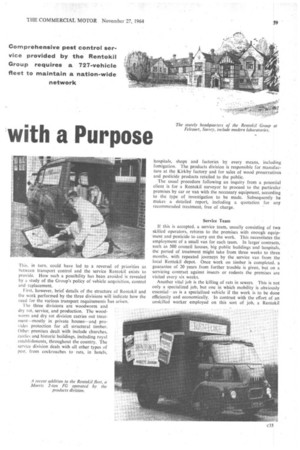Rat Race with a Purpose
Page 60

Page 61

If you've noticed an error in this article please click here to report it so we can fix it.
pEST control is big business. Likewise, loss to the nation through pests is high, whether reckoned in terms of food destroyed or spoiled, property damaged or illness spread by insects or rodents.
Recognizing the size of this problem, the Rentokil Group has in recent years built up a widespread industrial and domestic pest-control organization to combat this wastage. It serves industry, commerce, public services and homeholders from a network of 36 regional offices in Britain and II overseas companies extending from the Bahamas to Malaysia.
Ever since the Group started business in this country as the British Ratin Company in 1927, the actual sale of pest-control products has been considered only a part of the Group's activities. Economical and effective use of pesticides is a skilled job, and misuse can be dangerous. Accordingly, the Group concentrates an providing an expert service. It carries out continuous research on pesticides in modern laboratories at its headquarters at Fe!court, near East Grinstead, Sussex, and then makes its products at the new factory at Kirkby, Lancs. But the major proportion of Rentokil's total staff of around 1.600 does, in fact, comprise the mobile teams of trained service men. These are competent and equipped to deal with all types of pest problems and operate from strategically located bases throughout the British Isles and overseas.
Transport-wise. this emphasis on service is reflected in the composition and location of Rentokil's fleet of toad vehicles. Of the total Group fleet of 727 vehicles, II averaging 40,00045.000 miles per annum per vehicle cope adequately with delivery of the output of the Kirkby factory to retail customers
D8
and their own branches throughout England and Scotland. But no fewer than 471 commercial vehicles, plus 245 cars are needed by the mobile crews to maintain Rentokil's nation-wide service.
Superimposed on the basic transport problem of controlling this substantial fleet dispersed throughout Britain has been the additional problem of rapid growth, In the past five years Rentokil's rate of growth has been fourfold. With service closely allied to mobility being the essence of the Group's policy, an understandable—but mistaken—allied development could have resulted in the emergence of a transport empire.
This, in turn, could have led to a reversal of priorities as between transport control and the service Rentokil exists to provide. How such a possibility has been avoided is revealed by a study of the Group's policy of vehicle acquisition, control and replacement.
First, however, brief details of the structure of Rentokil and the work performed by the three divisions will indicate how the need for the various transport requirements has arisen.
The three divisions are woodworm and dry rot, service, and production. The woodworm and dry rot division carries out treatment—mostly in private house—and provides protection for all structural timber. Other premises dealt with include Churches, castles and historic buildings, including royal establishments, throughout the country. The service division deals with all other types of pest, from cockroaches to rats, in hotels,
hospitals, shops and factories by every means, including fumigation. The products division is responsible for manufacture at the Kirkby factory and for sales of wood preservatives and pesticide products retailed to the pdblic.
The usual procedure following an inquiry from a potential client is for a Rentokil surveyor to proceed to the particular premises by car or van with the necessary equipment, according to the type of investigation to be made. Subsequently he makes a detailed report, including a quotation for any recommended treatment, free of charge.
If this is accepted. a service team, usually consisting of two skilled operators, returns to the premises with enough equip-ment and pesticide to carry out the work. This necessitates the employment of a small van for each team. In larger contracts, such as 500 council houses, big public buildings and hospitals, the period of treatment might take from three weeks to three months, with repeated journeys by the service van from the local Rentokil depot. Once work on timber is completed. a guarantee of 20 years from further trouble is given, but on a servicing contract against insects or rodents the premises are visited every six weeks.
Another vital job is the killing of rats in sewers. This is not only a specialized job, but one in which mobility is obviously essential—as is a specialized vehicle if the work is to be done efficiently and economically. In contrast with the effort of an unskilled worker employed on this sort of job, a Rentokil
















































































































